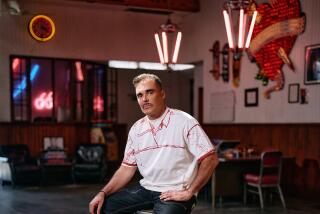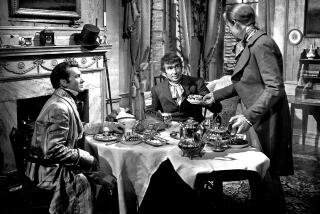Noel Coward’s blithe spirit lives on
Noel Coward once described himself as “an enormously talented man, and there’s no use pretending that I’m not.”
So he may have had an ego as big as the Titanic, but there’s no denying Coward was a genius whose brilliance traversed numerous mediums. A true renaissance man, Coward wrote such classic plays as “Hay Fever,” “Private Lives,” ’Blithe Spirit” and “Design for Living,” countless songs including “I’ll See You Again” and “Mad Dogs and Englishmen,” starred and directed in theater and film and even gave Oscar-winning director David Lean his first opportunity to become a filmmaker.
Even after he fell out of favor after World War II -- when the world seemed more interested in angry young men instead of Coward’s erudite bon mots -- he reinvented himself as a cabaret singer. Coward parlayed that success into TV specials and appearances in such films as “Around the World in 80 Days,” “Our Man in Havana” and “The Italian Job.”
“Star Quality: The World of Noel Coward,” a fascinating new exhibition at the Academy of Motion Picture Arts and Sciences’ Fourth Floor Gallery in Beverly Hills through April 18, offers a rare opportunity to look into the universe of one of Britain’s most influential talents, who died in 1973 at the age of 73.
Culled from the Coward Archives, as well as public and private collections in Europe and the U.S. and the academy’s own Margaret Herrick Library, the exhibition features rare photographs, drawings, paintings, original manuscripts, letters, sheet music, posters, audio and video clips, original costumes, cigarette cases and even the exquisitely tailored silk dressing gowns that became one of Coward’s trademarks.
Besides his theater and music career, the academy exhibition also chronicles how Coward was influenced by movies and how he, in turn, influenced films.
Coward’s stage directing style, says guest curator Brad Rosenstein of the Museum of Performance & Design in San Francisco, was also very cinematic, especially with his 1931 epic drama “Cavalcade,” which spanned 30 years in the lives of a wealthy British family. The British stage production featured a cast of 200, 22 major set changes, revolving stages and hydraulic platforms.
“In the earlier sections, it’s very realistic, almost like it’s a movie, but as the story moves further and further into the 20th century, it becomes more and more surreal,” says Rosenstein.
Fox Studios bought the rights to “Cavalcade” and the lavish 1933 film version won best picture as well as Oscars for director Frank Lloyd and art direction. Coward, though, was the linchpin for the film’s success.
“Fox filmed his stage production and used that as their bible when they were making their film,” says Rosenstein.
“Designer William Cameron Menzies translated his stage montages into movie terms and that became the language of movie montages for the next 30 years.”
As an actor, Coward’s first major film role was in 1935’s dark drama “The Scoundrel,” which won a writing (original story) Oscar for Ben Hecht and Charles MacArthur. His patriotic 1942 World War II drama, “In Which We Serve,” in which he starred, wrote, penned the music and co-directed with then-newcomer Lean, was nominated for best picture and original screenplay Oscars.
The academy also gave him a certificate for “his outstanding production achievement” for the stirring film screenplay based on the story of Capt. Lord Louis Mountbatten, who had been in command of a destroyer when it was sunk during the Battle of Crete.
Lean, who had been a film editor before “In Which We Serve,” never forgot Coward’s generosity. For several years, Lean directed films based on Coward’s work, including 1945’s “Blithe Spirit” and 1946’s über-romantic “Brief Encounter.”
Though he was the epitome of the sophisticated English gentleman, Coward hailed from poor beginnings -- his father was a failed piano salesman and money was tight. But his mother was ambitious and sent him to dance school in London.
By 1911 he was appearing in the children’s play “Where the Rainbow Ends” in London’s West End.
“The West End was his fairy land and that was the world he wanted to be part of,” Rosenstein says.
It was no secret that Coward was gay, but he never officially came out. As usual, he used humor to deflect the question, saying in his later years that he was reluctant to say he was gay “because there are still three old ladies in Brighton who don’t know.”
As a youngster, he was taken under the wing of actor-manager Charles Hawtrey, who had cast him in “Where the Rainbow Ends.”
“Until the day he died, Coward said this is the man who taught him basically everything he knew,” says Rosenstein. “He was like a sponge around Hawtrey.”
Not only did Coward help transform stage acting, he also changed the language of plays. “He really took dialogue into much more spare, much more contemporary rhythm,” says Rosenstein.
“There’s a wonderful quote from Kenneth Tynan, who said, ‘Coward was the Turkish bath in which English comedy slimmed.’ ”
For more information on the exhibition, go to www.oscars.org.
More to Read
The biggest entertainment stories
Get our big stories about Hollywood, film, television, music, arts, culture and more right in your inbox as soon as they publish.
You may occasionally receive promotional content from the Los Angeles Times.











